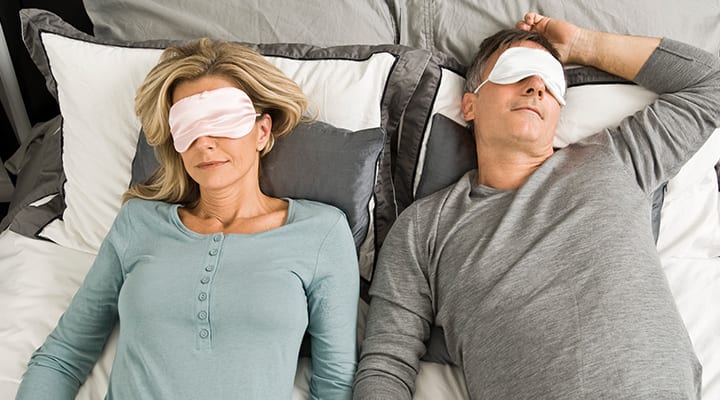
How Much Melatonin Should I Take?
Published: October 2022
Ah, sweet sleep! It soothes the mind, allows the body to recharge our energy levels. We used to sleep like babies, able to nod off at bedtime soon after our heads hit the pillow. But now drifting into dreamland isn’t always as easy as we’d like. (Or, we fall asleep easily enough but find ourselves wide awake at 2 in the morning.)
If counting sheep isn’t working, melatonin supplements may be able to help—with low risk of side effects.
Your body produces the hormone melatonin when it gets dark, and bright light (such as the morning sun) tells your body to stop producing it. This is why you’ve heard the advice about powering down your digital devices an hour before bedtime—all that bright blue light is disruptive to melatonin levels and normal sleep patterns.
Melatonin naturally calms your body down and helps you feel drowsy, which helps you fall asleep once melatonin increases to sufficient levels in your body. It has strong antioxidant properties, as well, and has been shown to support immune health and brain function and to help maintain already-healthy blood pressure.
Who should take melatonin?
Although we produce this “sleep hormone” naturally, adding melatonin through a dietary supplement is a good way to ensure you get regular, restful sleep. Melatonin helps to reset our natural circadian rhythm, which can be thrown off by temporary issues like overnight or rotating shift-work or travel-induced jet lag.
If you’re a night owl, but need to be awake early, melatonin supplementation (also called exogenous melatonin) is a good choice to help you feel tired earlier and get the sleep you need. If you’ve returned from traveling and are feeling some jet lag from the time zone change, melatonin can help you regain a healthy sleep-wake cycle.
Melatonin isn’t a substitute for good sleep habits. So if you continually struggle with sleep night after night, lifestyle changes might be needed to restore your circadian rhythm. (Putting down that afternoon cup of coffee or going to the gym earlier in the day might also help.)
You should take melatonin at night, about 30-60 minutes before bedtime, to help calm your mind and body for sleep. Incorporate other sleep-promoting habits, such as soft music or a warm cup of chamomile tea, for maximum effect.
And remember, melatonin isn't only for healthy sleep, thanks to its antioxidant activity and support for already-healthy blood pressure. It also encourages a healthy immune system response, protects cognitive function as we age and supports healthy cellular DNA. For this reason, Life Extension recommends daily melatonin supplementation, unless your healthcare professional recommends otherwise. Published studies suggest that daily melatonin has a high profile.
Can melatonin be taken daily?
Melatonin can be taken every day with a low risk of side effects. It has been studied extensively through controlled trials, even at high doses. The side effects of melatonin supplements that have been observed in clinical trials are minimal. However, the likelihood of those side effects increases with the melatonin dosage.
Melatonin is best taken 30-60 minutes before bedtime. There are various forms available at different doses.
It’s important to note that exogenous melatonin affects everyone differently. This is why some people say it doesn’t work for them, or they fall asleep faster but wake more easily in the night. Some people may have next-day sleepiness—if this happens to you, try taking a lower dose. You may know someone who happily drifts off into dreams after taking a 3 mg gummy, and another who says they need 10 mg to help them sleep. Some people are more “sensitive” to melatonin, so what works for them may not work for someone with similar characteristics.
Taking melatonin supplements—in combination with good sleep habits—can help normalize your circadian rhythm and promote healthy sleep patterns.
5 Tips for Better Sleep
There’s nothing like the frustration of lying in bed, knowing we need to sleep but unable to slip into slumber. Practicing healthy sleep habits can go a long way toward calming your body and mind enough to fall asleep. These 5 tips can help:
1. Turn it off.
We know you don’t want to, but say bye-bye to your digital devices at least an hour before bedtime. Not only will this protect you from those sleep-disrupting blue lights, but it will also shut down the stimulation of social media, which might keep your mind racing far past bedtime.
2. Avoid caffeine and alcohol.
Those late-afternoon or evening cups of coffee (or even soda) are sending stimulants into your bloodstream—not ideal for powering down at the end of a long day. Alcohol is the opposite, a depressant that messes with melatonin production. So you might feel like “wine-ing” down at the end of the day, but if you want a full night of sleep—without a 3 AM wakeup call—just say no.
3. Close the kitchen early.
Eating too close to bedtime puts your body to work digesting all those nutrients and calories that you just so-helpfully shoveled into your system. Not only will this prevent your body from preparing for sleep, but your digestive system might not thank you for the late-night load.
4. Mellow out with music.
Lullabies are not just for babies. Studies find music is sleep-inducing for adults as well, and many report better sleep quality after listening to music before bed.5. Lower the lights.
Digital blue light isn’t the only sleep-buster. Bright lights in general can disrupt your natural sleep-wake cycle because they shut down your internal melatonin production. Lower your lights as you wind down to signal to your body that it is time to sleep.Does melatonin dosage matter?
As with most things, it is best to start with the lowest dosage, with increases over time until you find the melatonin dosage that is right for you.
It's important to keep in mind that the body's melatonin production naturally declines over time, which is one reason why sleep support options are so popular. Melatonin increases might be needed to maintain healthy sleep-wake cycles as you age.
Explore Our Best Sleep Supplements
Is melatonin dosage based on weight?
Whether weight matters depends on your melatonin administration. A science-backed observation study found that immediate-release melatonin can be affected by BMI, thanks to melatonin diffusion into fat mass and other factors.
That said, melatonin dosage is mostly affected by age, thanks to the naturally-occurring decrease in this hormone.
What is the typical melatonin dosages for adults?
Typical melatonin dosages in placebo-controlled trials range from 0.1 mg to 10 mg, and those melatonin levels are considered safe. Remember to start at a low dosage, with gradual melatonin increases until you get to the milligram level that is right for you.
Melatonin supplements generally range in milligrams from less than 1 to 10, and they come in liquid, lozenge and gummy form, as well as capsules and tablets. There are also differences in melatonin administration, with immediate- and prolonged-release formulas. These can help jumpstart and maintain a regular and restful sleep-wake cycle.
As with any supplement, you should talk to your doctor or healthcare provider before taking this hormone—and if you continue to need additional sleep support. They might be able to help you identify sleep habits that need changing.
Is melatonin for kids?
As with adults, the use of melatonin in children should first be discussed with a doctor or healthcare provider. Supplements for children generally have lower melatonin levels and should be used as suggested by a doctor or healthcare provider.
Immediate- vs. extended-release melatonin
As the names suggest, these forms of melatonin supplementation help you fall immediately asleep or help you stay asleep. A recent meta-analysis of 23 clinical trials found that both immediate-release and prolonged-release melatonin had a significant effect on sleep quality.
With immediate-release melatonin, a placebo-controlled trial found those randomized to receive melatonin fell asleep 34 minutes earlier, on average. Clinical trials with controlled-release melatonin regiments found subjects reported improved quality of sleep and morning alertness.
So which form is better depends on your own sleep patterns. If you want to fall asleep faster, try instant release melatonin. If you want help to stay asleep, slow-release is the better choice. Or choose a melatonin regimen with both forms for even more benefits.
Which melatonin is most effective?
Melatonin use is subjective, and which form is better will vary from person to person. But a meta-analysis of controlled trials shows many people can benefit from this dietary supplement.
Some blends, such as Melatonin IR/XR, combine immediate-release and extended-release melatonin to help you get to sleep quickly and then stay asleep for up to seven hours. Other sleep aids deliver melatonin in gummies or liquid form to encourage healthy rest. Some supplements combine melatonin with other sleep-promoting compounds, such as ashwagandha, citrus peel and milk peptides, to help you rest well.
Whether you choose immediate or extended release, you can rest easy knowing melatonin is helping fight oxidative stress and support already-healthy blood pressure while you get the sleep you need.
References
- Ahn JH, et al. “Prolonged-release melatonin in Parkinson's disease patients with a poor sleep quality: A randomized trial.” Parkinsonism Relat Disord. June 2020. https://pubmed.ncbi.nlm.nih.gov/32480307/
- Andersen L, et al. “The Safety of Melatonin in Humans.” Clinical Drug Investigation. December 2015. https://link.springer.com/article/10.1007/s40261-015-0368-5
- Carriedo-Diez B, et al. “The Effects of the Exogenous Melatonin on Shift Work Sleep Disorder in Health Personnel: A Systematic Review.” Int J Environ Res Public Health. August 2022. https://www.ncbi.nlm.nih.gov/pmc/articles/PMC9408537/
- Fatemeh G. “Effect of melatonin supplementation on sleep quality: a systematic review and meta-analysis of randomized controlled trials.” J Neurol. January 2022 https://pubmed.ncbi.nlm.nih.gov/33417003/
- Lemoine P, et al. “Prolonged-release melatonin improves sleep quality and morning alertness in insomnia patients aged 55 years and older and has no withdrawal effects.” J Sleep Res. December 2007. https://pubmed.ncbi.nlm.nih.gov/18036082/
- Newsom R. “Music and Sleep.” Sleep Foundation. September 2022. https://www.sleepfoundation.org/noise-and-sleep/music
- Savage R. “Melatonin.” NIH. August 2021. https://www.ncbi.nlm.nih.gov/books/NBK534823/
- Schrire Z, et al. “Safety of higher doses of melatonin in adults: A systematic review and meta-analysis.” JPR. December 2021. https://onlinelibrary.wiley.com/doi/full/10.1111/jpi.12782
- Sletten T, et al. “Delayed Sleep on Melatonin (DelSoM) Study Group. Efficacy of melatonin with behavioural sleep-wake scheduling for delayed sleep-wake phase disorder: A double-blind, randomised clinical trial.” PLoS Med. June 2018. https://pubmed.ncbi.nlm.nih.gov/29912983/
- Veyrier M, et al. “Use of immediate release melatonin in psychiatry: BMI impacts the daily-dose.” Encephale. April 2021. https://pubmed.ncbi.nlm.nih.gov/33349460/
Always be in the know!
Access the latest deals, wellness news, expert health tips & more!









